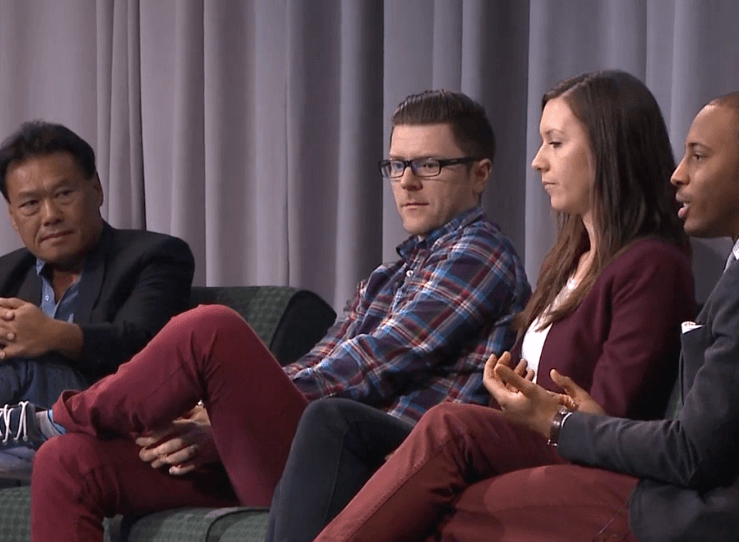Don’t give up: Lessons for the social entrepreneur

If there was just one lesson to take away from last week’s Entrepreneurship 101 Meet the Entrepreneurs panel discussion on social innovation, it was this: Don’t give up, because what you are doing is important.
Our social innovation panelists were Emily Branton, president of Link2Feed; Ryan Porter, CEO and co-founder of Raise Your Flag and Going 180 Media; and Kevin Lee, executive director of Scadding Court Community Centre. They inspired our audience with advice and insights on how to: 1) leverage the Canadian brand in international markets; 2) leverage your social impact in investor meetings; and 3) leverage the resources around you to keep you going during the hard days.
Leverage the Canadian brand
Our panelists acknowledged that the Canadian entrepreneurial ecosystem is different from that of the United States, and said that the differences between the two can be useful when you’re selling into international markets. Canadian social entrepreneurs in particular can benefit from our country’s reputation as being more socially conscious. In addition, because investors like to see strong teams, the level of loyalty and community that Canadian entrepreneurs experience compared to what entrepreneurs experience in the US can also earn Canadian companies brownie points. Kevin Lee reminded the group that our cities, provinces and country are relying on entrepreneurs to make the economy vibrant and globally competitive. With that in mind, know that there are resources available to support your growth across all sectors: private, public and third sector (or non-profit), whatever your social impact.
Leverage your social impact when pitching to investors
Your social impact is a strength, not a weakness. While our panel recommended not rushing after investor-backed funding, Emily said, “Don’t think of an investor as someone who would not be interested in your social mission.” In fact, do your homework on potential investors, as you may find someone whose backstory matches your mission. You will still need to prove that your business is viable, and it can be very useful to lead a pitch with the business piece because it is what investors understand, but don’t be afraid to own the social impact of what you do. Given that investors meet with startups every day, it helps to have an edge over your competitors; your venture’s social impact may end up being a big part of what sets your business apart from the rest.
How you perceive your startup before approaching investors is important. Kevin recommended that when you meet with an investor, you shouldn’t pigeonhole your venture based on your own view of social innovation. Ryan reinforced the idea that its important to balance your social goals with your business goals, saying, “Being a social entrepreneur isn’t a hall pass to being a crappy entrepreneur.” Imagine a scenario that benefits everyone: you want to create a revenue stream for yourself and your stakeholders while collectively creating a social dividend.
This may sound idealistic if you are in the challenging early phase of setting up your venture, but successfully growing your social enterprise is not impossible. You can make it if you take advantage of available resources.
Leverage the resources around you
Ryan described Toronto’s support network for entrepreneurs as “incredible.” Emily’s clients have been a major source of support, she says; occasionally she will have clients call her just to tell her that they think what she is doing will change the world.
If your product or service adds value and provides a social good, you may find that your clients are willing to take risks on you and rally around you. People are a great resource. As Kevin said, “Don’t do it alone…in terms of how you’re going to move and scale your business.” Especially on the days when the going gets tough and as Ryan put it, “your breakfast tastes like your startup,” it’s important to remember these things. It’s also important to step away from the business sometimes and find outlets that help you forget about the business.
Finally, and most importantly, if you need to remind yourself why your work matters, ask yourself a question similar to the one Emily asks herself from time to time, “What would the world be without my social enterprise?” Good luck!
For more of the insights from this great discussion, check out the video.
Register for Entrepreneurship 101: The next lecture is on Wednesday, November 26, 2014, and focuses on IP management.
Resources:
- Article: Social Innovation
- Video: Innovating Innovation
- Video: Meet the Entrepreneurs: Social Innovation – Entrepreneurship 101 2014/14
- Article: Social Enterprise Business Models
Want to connect?
- Join the Entrepreneurship 101 LinkedIn Group
- Follow the conversation on Twitter: #ent101
- Get updates on Vimeo
- Download the course schedule
- Download the course syllabus
Missed a lecture? We have an extensive online resource section, which includes videos, slides and relevant articles for each Entrepreneurship 101 session. Find these in the Entrepreneur’s Toolkit.